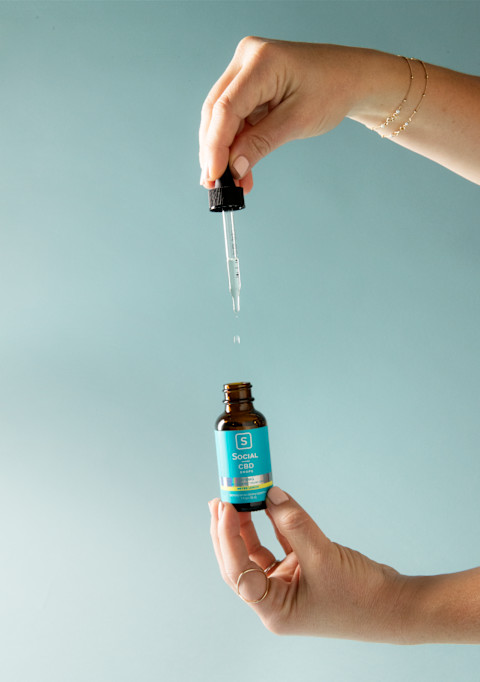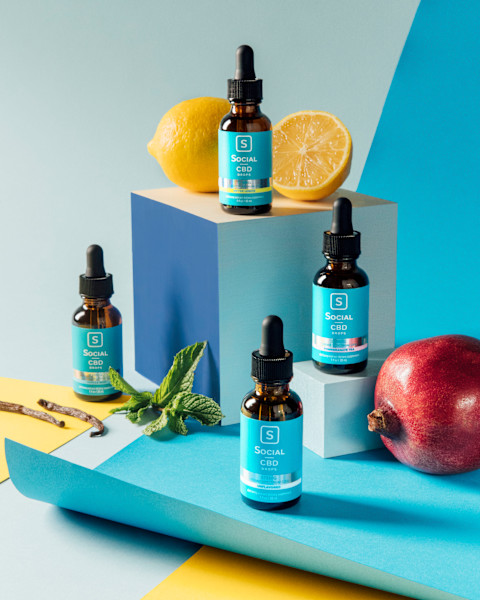Your Body Makes Cannabinoids Similar to CBD + 4 Other Fascinating Facts About The Endocannabinoid System

Everyone's talking about CBD, short for cannabidiol, which is just one of the many compounds found in the hemp plant. But have you ever wondered why cannabinoids like CBD actually affect the body—and how? The answer has everything to do with the endocannabinoid system (ECS), a large system of compounds, receptors, and enzymes that regulates various important functions throughout our body.
If you've never heard of the ECS, you're definitely not alone. Cannabinoids like CBD tend to get all the fame and glory. But the truth is, the ECS is the second-largest neurotransmitter system in the human body and is what ties everything—hemp, the benefits of cannabinoids, and your body—together. Read on for five fascinating things worth knowing about the endocannabinoid system:
1. It was discovered after CBD.
CBD was first isolated1 in the 1960s, but the endocannabinoid system wasn't discovered until the 1990s (1992, to be exact). Interestingly, studying cannabinoids like CBD actually led directly to the discovery of the endocannabinoid system. When scientists were trying to figure out why and how the plant compounds in hemp affect human physiology, they discovered that we have an entire system of cannabinoid receptors within our body.
This isn't the first time that researching plants has led to a deeper understanding of the human body: Studying opium, for example, a substance derived from poppies that are used in painkillers, led to the discovery of endorphins.
2. Our body produces its own version of CBD.

CBD and THC are known as cannabinoids, but we should really be calling them phytocannabinoids because they come from plants (phyto means "of a plant"). The difference matters because our body also produces its own version of these compounds, called endocannabinoids (produced endogenously). These endocannabinoids act on the same receptors as the cannabinoids that come from plants—both types sharing a similar effect on our body.
One endocannabinoid, in particular, called anandamide, is known as the "bliss" molecule because it interacts with our bodies in a similar way as THC. In fact, a 2015 study2 showed that high levels of anandamide played a role in mood enhancement and fear reduction in humans and mice.
3. The ECS is designed to maintain balance.
So if the ECS is such a giant system, why are so many of us just hearing about it now? One explanation reasons that the ECS is so vast, it's almost hard to pinpoint. Its receptors are sprinkled throughout our brain, immune cells, organs, skin, GI tract, and even our connective tissues and bones.
It's often described as a "master regulatory system" because one of its main jobs is to maintain homeostasis, which is just another way of saying it helps maintain balance. In a 2013 paper3 published in Cerebrum, the editor wrote that the "endogenous cannabinoid system—named for the plant that led to its discovery—is one of the most important physiologic systems involved in establishing and maintaining human health."
Knowing this, it won't surprise you to learn that the ECS appears to play a role in major bodily functions like reproduction, metabolism, mood, and appetite. It's also intertwined with the stress response, which is why so many people turn to CBD oils—like these Social CBD drops infused with lavender, passionflower, and chamomile—to push pause on a stressful day.
4. The essential oils in hemp can stimulate the ECS.
Even though the spotlight had mainly centered on CBD, that's not the only ingredient in CBD oil to care about. We should also be paying attention to terpenes, which are often described as the essential oils of the hemp plant. Terpenes seem to display their own benefits that work synergistically with cannabinoids. For example, one terpene called beta-caryophyllene is also able to activate the CB2 cannabinoid receptor, which means it can influence the ECS in its own right.
This is more widely known as the "entourage effect," and it's one reason researchers think extracts from a whole plant—a format known as broad-spectrum—are more powerful than a CBD isolate, which contains just the CBD compound alone, stripping out terpenes like beta-caryophyllene.
Broad-spectrum hemp-derived CBD extracts give you the full plant benefit without psychoactive effects as the THC is isolated and removed from the finished product. Just be sure to look for a high-quality product: Social CBD's Broad Spectrum CBD Drops, in particular, go through several layers of third-party testing that screens for 39 residual impurities and 70 pesticides.
5. The ECS isn't always functioning as well as it should be.

Unfortunately, our endocannabinoid system doesn't always function at maximum capacity. Researchers have even coined the term "clinical endocannabinoid deficiency4" to describe a condition where a person doesn't have adequate levels of endocannabinoids circulating throughout their body.
How can you protect the health of your ECS? There's still a lot to learn about this, but it appears factors like lifestyle, exercise, and diet play a role in the health of the ECS. Endocannabinoids are synthesized from omega fatty acids—getting the right ratio of omega-3 to omega-6 fatty acid is a good place to start.
And then, of course, there's CBD oil. It's thought that consuming phytocannabinoids, like those found in a Social's broad-spectrum CBD oil, can help support the endocannabinoid system as well. Plus, their flavors make this a really easy habit to build into your wellness routine.
